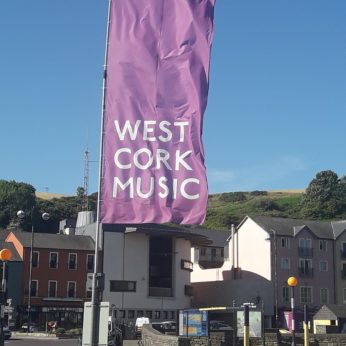Composer: Anton Arensky (b. 1861 - d. 1906)
Performance date: 30/06/2018
Venue: St. Brendan’s Church
Composition Year: 1894
Duration: 00:31:44
Recording Engineer: Ciaran Cullen, RTÉ
Instrumentation: 2vn, va, vc
Instrumentation Category:String Quartet
Artists:
Apollon Musagète Quartet (Paweł Zalejski, Bartosz Zachłod [violins], Piotr Szumieł [viola], Piotr Skweres [cello]) -
[quartet]

8. CRESPO SERIES – ST BRENDAN’S CHURCH 16.00
Apollon Musagète Quartet
Pawel Zalejski, Bartosz Zachtod [violins]
Piotr Szumiet [viola]
Piotr Skzeres [cello]
Anton Arensky [1861-1906]
Quartet No.2 in A minor Op.35a [1894]
1. Moderato
2. Variations on a Theme by Tchaikovsky – Moderato
3. Finale – Andante sostenuto – Allegro moderato
In his lifetime Anton Arensky was one of the most successful composers and pianists in pre-Revolutionary Russia. He studied under Rimsky-Korsakov and was made a Professor of Harmony and Counterpoint at the Moscow Conservatory when only 21.His position brought him into close contact with Tchaikovsky and Taneyev and his students included Rachmaninov, Scriabin, Glière and Gretchaninov. He also directed the concerts of the Russian Choral Society before moving in 1894 to St Petersburg to succeed Balakirev as Director of Music at the Imperial Chapel. He relinquished this post in 1901 in order to devote himself to composition. After decades of hard living and heavy drinking, he died at an early age.
His two best-known chamber works, this Quartet and the Piano Trio, were both written in memoriam – the Trio for a cellist colleague, the Quartet more famously for Tchaikovsky, whose shocking and controversial death occurred the previous year. Arensky’s student, Rachmaninov, also wrote a work mourning the passing of Russia’s most famous composer.
The original, quirky version of this Quartet had two cellos instead of two violins, but there is also a version for regular string quartet, which we hear today. Arensky uses musical quotations to devise a simple but effective programme. The first movement opens and closes with the sonorous theme of an Orthodox psalm. This dark, chant-like theme reappears at key structural moments throughout the rest of the Quartet and its sombre hue contributes to the funereal atmosphere.
The central Variations movement is based on Tchaikovsky’s Legend from his Children’s Songs but are now more familiar in their later arrangement for string orchestra. The seven Variations each explore the theme with different tempi and scoring with the final Variation and coda recalling Tchaikovsky’s famous Andante cantabile from his First Quartet.
The Finale opens with a theme from the Russian Orthodox funeral Mass that abruptly gives way to the celebratory folksong straight out of the coronation ceremony of the Tsar and previously exploited by Beethoven in his Second Rasumovzky Quartet and later by Mussorgsky in Boris Gudonov. Arensky is thus in no uncertain style crowning Tchaikovsky as the Tsar of Music.
Francis Humphrys
Copyright © 2025 West Cork Music. All rights reserved.
Designed and developed by Matrix Internet